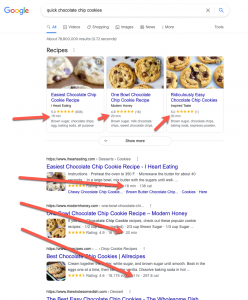
Search engine optimization (SEO) is NOT dead – but most of its strategies are.
If you remember link-building, article submissions, and blog commenting, you probably belonged to a time when digital marketers could get away with simply bookmarking a keyword-rich blog post on Digg. But search engines like Google, has grown a lot since then.
Although plenty has changed, there are quite a few things that remain the same. For instance: structuring your web pages ensure that your content will be easily read by search engines.
Just because modern online marketing appears to have been dominated by social media doesn’t mean that it’s all where your efforts will go. By exploring “smaller” strategies and finding out which ones work best, you can increase results in record time as you’re not competing with a huge pool of similar campaigns.
Yes, keyword-stuffing may be out – but similar tactics like tracking rankings, isn’t. Here are five “outdated” SEO techniques and why they still matter today.
1. Tracking Rankings
Being #1 on Google doesn’t immediately equate to more traffic or sales. That’s because have become smarter and more informed when it comes to searching online. Instead of “shoes” for example, they may look for something more specific like “running shoes for sale near Buffalo”. This has made keyword-dependent SEO strategies obsolete in just a few short years.
But that doesn’t mean you shouldn’t keep watch over where you stand on SERPs. Being on the top five still has its benefits, one of which is getting more clicks. In a 2014 organic CTR study by Moz, websites on the first page of Google received an average of 71.33 percent clicks, while those on the second and third pages got only 5.59 percent. This doesn’t account for user intent or brand searches.

The study shows that being seen among top results still matters because that’s where most people are drawn to. Just don’t be obsessed with getting that #1 spot because it’s not as valuable as before. People may have clicked on your link, but the most crucial aspect comes after that. If they see that you’re NOT what they are looking for, they will leave.
So keep tracking your rankings to ensure you’re still competitive – but don’t dwell on it. Instead, focus on user intent (why are your customers searching for these terms?) and building up your brand (what makes you unique?).
2. Social Bookmarking
Between 2000 and 2010, saving links on sites like StumbleUpon and Delicious became highly popular to many digital marketing agencies. It served several purposes, the most important of which is faster indexing. Social bookmarking is still used today by most folks to remember links they love and intend to read for later. However, it’s not a talked about strategy anymore in terms of acquiring traffic.
SEJ founder Loren Baker though, thinks otherwise. Social bookmarking may no longer be popular – but it’s still an awesome way to get your posts noticed by interested users. Niche industries will also benefit from this tactic because proper tags from social bookmarking sites will cue search engines about its category, which can help them align the content to relevant searches.

Aside from those mentioned above, go for niche-specific sites such as Kaboodle, Gather, and Digg to really tap into your target market. Other popular options include Pinterest, Twitter, and Reddit.
When using this outdated SEO strategy, apply the Pareto Principle to make it more effective and natural. This means promoting your links only 20 percent of the time, and spending the remaining 80 percent bookmarking other links. This does two things: first, it populates your account with relevant links from both your brand and other people; second is that it showcases your interest in others, improving your digital presence.
3. Press Releases
Although technically NOT a real SEO strategy, a press release is still one of the fastest ways to get attention for your brand – but only if you really have something news-worthy to share. In the past, this tactic received negative feedback due to a few SEO agencies using them to gain quick links. Not only is this practice frowned upon today, PR agencies have become stricter in what forms of news they accept.
However, if you indeed have groundbreaking news, it would be a good idea to have them published on high-authority websites such as PR Web, Business Wire, and PR Newswire. Keep your submissions short, to-the-point, and interesting so that people would be more likely to read it.
Aside from traditional press releases, media mentions are another great option you may want to sink your teeth into. In essence, they are credits to you or your brand for helping a reporter out with their story. Content marketer Liz Froment uses this strategy to help her clients – as well as herself – gain referrals from top websites. In a blog post, Liz shares her tips for gaining media mentions from HARO.

4. Directories
Back then, one of the famous link-building techniques included listing your website in plenty of directories. This is one of the first problems Google tried to get rid of when they updated their Penguin algorithm. So unless the directory you’re listed in today is highly relevant to your industry as well as location, you could be penalized for building unnatural links.
Since the Pigeon Update was rolled out in 2014 though, directories are making a comeback to the digital marketing game. But unlike the “free for all” strategy of the past, listings nowadays need to be local, relevant, and real.

Keep these pointers in mind if you’re planning to submit your website to a local directory:
- Make sure the directory you want to get into is a reputable one (examples: Best of the Web, Yahoo Regional Directory, Yelp, Better Business Bureau, etc.)
- Observe consistency with your business name, address, and contact details. This could be tricky if you suddenly changed details and you’re listed in more than a dozen directories.
- Try to limit the number of directories you want to be in. Focus on their relevancy to your niche (i.e. TripAdvisor for travel, FourSquare for shops and dining, etc.) and city.
- Look for directories that are maintained by real humans. These would often have a price to them, but it’s a great investment as you know your business will be in good company.
If you own a local shop or eatery, getting listed on a trusted directory would be a boost for your business. For one, you will be visible to hundreds of people who are interested in local searches every day. Second, many local directories today also have an accompanying app. This helps your website gain presence on mobile.
5. Forums and Blog Comments
The war on spam is never over. Although Google has worked hard to devalue plenty of unnatural link-building schemes, several folks would still try to outdo the system. One strategy that some SEO agencies still abuse to this day is writing comments on blogs and putting links in forum threads. The reason why this still persists is because these practices tend to increase one’s number of backlinks. More backlinks mean more traffic, right?
Not exactly. Comments made for the purpose of gaining links may be considered as gray-hat, but it’s going to pull down your rankings once Google gets a whiff of your intent.
However, that doesn’t mean blog comments and forums are dead. On the contrary, practicing these strategies within reason will allow you to showcase your expertise in your field; thus, helping you build online authority.
For commenting on blogs, signing up on communities such as Disqus ensures you’re connected to all your favorite sites, while keeping tabs on those who replied to your comments. Quora is another great online community that connects various field experts with people with burning questions.

Leverage this “outdated” SEO strategy by:
- Joining in niche-specific forums and blogs. Limit yourself to about two or three, so you could be highly active in them. Remember: your goal is to share your knowledge with others – NOT build links!
- Use the site’s Bio to include your website link in. By optimizing your profile on those communities, you increase your chances of becoming an authority on your chosen industry.
- Avoid anchor keywords! Be genuine. Include your profession or expertise, your social media profiles, and a little fun fact about yourself. This personalizes your community profile for viewers.

- Don’t abuse this strategy! Your objective aside from building your credibility is to connect with similar-minded individuals. Be polite, courteous, yet sincere.
Please keep in mind that as these sites are considered to be reputable, they have strict standards when it comes to what you post. But if your intentions are clear (i.e. you joined these sites because you really want to help others), then there’s nothing to worry about.
Bottom Line
Today, SEO is no longer focused on keywords and ranking. Instead, it looks at engagement, long-term results, and building connections. It can no longer function alone. Instead, it needs to seamlessly integrate itself with other aspects of digital marketing such as content, social media, and web design.
Digital & Social Articles on Business 2 Community(82)
Report Post







